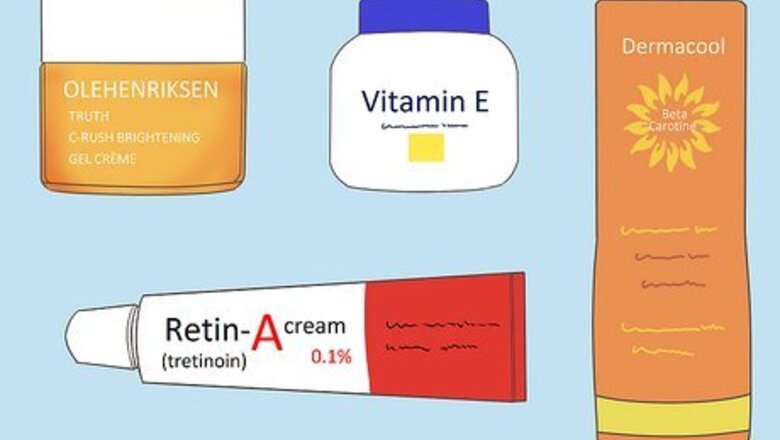
views
Using Skincare Products

Apply moisturizer daily. For best results, use a moisturizer that contains ingredients such as vitamins C, A, E and beta-carotene. Moisturizers that contain retin-A (an acidic form of vitamin A) can be used on the skin to encourage the multiplication of cells. Retin-A products are available in the form of serums, ointments and creams.

Use vitamin E oil topically. Prick a capsule containing vitamin E and squeeze its contents into your hands, before applying to the skin.
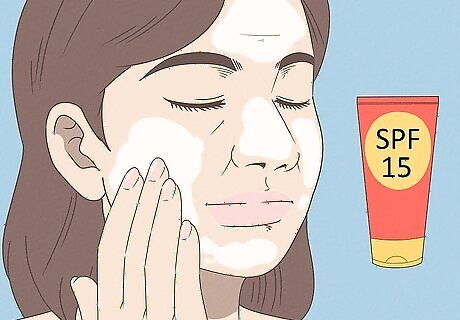
Always wear sunscreen outdoors. Wear sunscreen daily, especially in areas that are very hot during the summer. Try to wear an SPF of at least 15 (or higher if you have particularly pale or sensitive skin), even if it's a cloudy day, as UV rays from the sun can penetrate the clouds.

Avoid using steroid creams on the skin. If possible, avoid using steroid creams on the skin, as these can have a thinning effect. Talk to your doctor if you have been prescribed a steroid cream to treat an underlying skin condition like eczema. A dermatologist can usually prescribe alternative topical treatments that do not contain steroids.
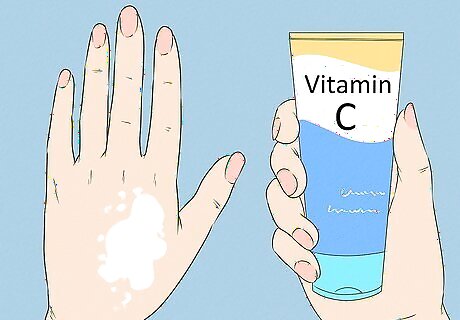
Apply products that contain vitamin C. Apply serums, creams and lotions that contain vitamin C. Vitamin C helps to plump the skin and encourage the production of collagen. This helps the skin to thicken when used regularly.
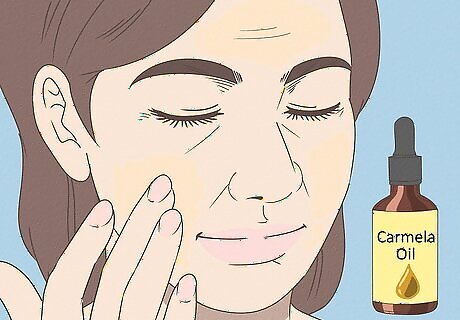
Use camellia oil salve on the skin. The seeds of camellia flowers can be pressed to get camellia seed oil. This oil can be used to thicken the skin. To make the salve, mix a few drops of the camellia seed oil with 1/4 teaspoon of vitamin E oil, 3 drops of lavender oil and one teaspoon of primrose oil. This mixture should be shaken before use. Massage a few drops of the salve onto the skin daily to help thicken it. The salve should be kept refrigerated between uses.

Try using topical antioxidants to prevent skin damage. Topical antioxidants can be used to prevent skin damage and repair damaged skin. Look for topical products that contain any of the following ingredients: Green tea extract, vitamin A, vitamin E, tocotrienols, alpha lipoic acid, and pentapeptides.
Modifying Your Diet
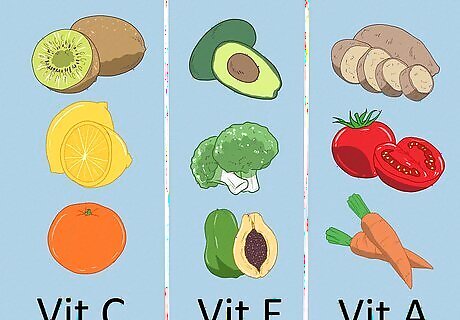
Eat foods that are rich in vitamins C and E. These vitamins repair worn out tissues in the body and therefore slow down the aging process. Foods rich in vitamin C help to increase collagen production, which helps to thicken the skin over time. Foods that are rich in vitamin C include citrus fruits, oranges, kiwi fruit, broccoli, tomatoes and cauliflower. The daily requirement of vitamin C is 75-90 mg. Foods that are rich in vitamin E are olive oil, avocados, broccoli, pumpkin, papayas, mangoes and tomatoes. The daily requirement is 15 mg. Foods rich in vitamin A include oranges, pumpkin, sweet potatoes, spinach and carrots. The daily requirement for vitamin A is 700-900 mg.

Stay hydrated. Water helps to remove waste products and toxins from the body, therefore revitalizing the skin. It also helps to improve skin elasticity and allows it to heal naturally. Aside from drinking water, you can also improve your hydration levels by drinking herbal teas and eating fruit and veg with a high water content, such as watermelon, tomato, beets and celery. How much it benefits your skin to drink water is debatable, mainly because the water will reach your other organs before reaching your skin. However, while not everyone agrees that drinking more water will improve skin, others insist that it does, and it won't hurt.
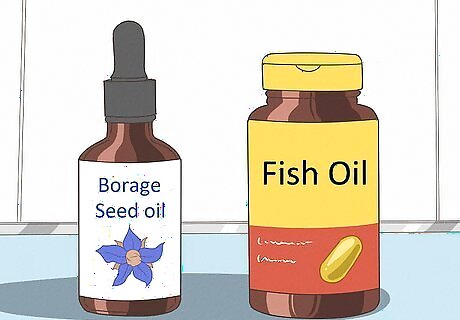
Take borage seed oil or fish oil supplements. Supplement your diet with borage seed oil and fish oil. These help in strengthening collagen beneath the skin and in keeping the skin hydrated. These oils are also rich in vitamin B3, which is important for healthy skin. One form of vitamin B3 (known as niacinamide) may possibly help reduce wrinkles and improve skin elasticity. The recommended dosage of fish oil is around 1,000 mg, while the standard dosage of borage oil varies between 230 and 720 mg depending on age, sex, and manufacturer. Always check the manufacturer's instructions on any supplement you purchase since dosages may vary.

Consume bone broth. Bone broth is a traditional food which is known to boost the immune system. It is an excellent source of minerals and gelatin. Bone broth also supports the joints, hair and skin due to its high collagen content. To make bone broth, look for high quality bones from grass fed cattle, bison, pastured poultry or wild caught fish. Add 2 pounds of bones to one gallon of water and bring to boil. Lower heat and continue boiling for 24 hours for meat bones or 8 hours for fish bones. The purpose of boiling for a long time is to really soften the bones so you are able to extract a gelatin-like liquid using a sieve. Drink the broth or mix with other dishes. Strengthen fragile skin through lifestyle shifts. "My increasingly fragile skin alarmed me. This thorough article addressed causes and multiple solutions — from products, diet, and lifestyle shifts to skin-shielding clothing. Though already applying some strategies, the new suggestions like bone broth and antioxidants give me more tools to rebuild resiliency. Tackling this issue from all angles, as advised here, reassures me I can make meaningful improvements." - Danielle S. Treat steroid-thinned skin gently. "Just two weeks of using a steroid cream made my leg skin super thin and delicate. This article opened my eyes to the thinning effect of steroids. It gave clear, practical tips like moisturizers, oils, diet changes, and sun protection to try rebuilding thickness and strength in fragile areas. The visuals helped me grasp key ideas. My skin now heals slowly, so this guidance on non-irritating products and care is invaluable." - Knox E. Rebuild thin skin with vitamins and oils. "I sought natural methods to improve my thin, bruising skin. As part of my daily regimen, oils, and supplements already boost my health. I appreciated learning specifically which vitamins and oils can thicken skin over time through collagen production and hydration. Adding these skin-friendly nutrients will compound my other wellness efforts!" - Kitty W. Soothe worried minds with gentle guidance. "Anxious over my worsening thin skin, I desperately needed advice. Stumbling on this site, the thoughtful, gentle suggestions finally eased my fretting mind. Details like circulation-boosting massage or quitting smoking provide comfort along with healing potential. Now, I can try these remedies with optimism — and patience for their restorative magic." - Lin G. Have a story our readers should hear? Share it with 1 billion+ annual wikiHow users. Tell us your story here.
Making Lifestyle Changes

Try to exercise every day. Take a 40-minute walk daily or jog for half an hour. This helps to improve circulation, which allows for the distribution of nutrients in the body. This ensures that the skin gets the nutrients it needs to rejuvenate itself and stay healthy.
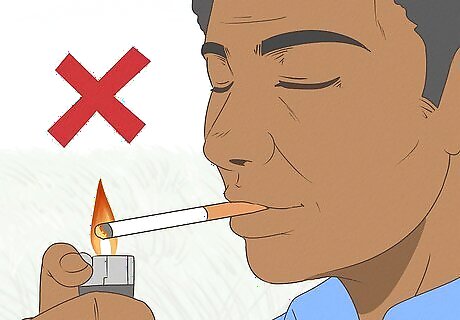
Quit smoking. Smoking increases the level of nicotine in the body and decreases the circulation of the blood. This results in less nutrients being absorbed by the skin and less toxins being released from the skin, causing reduced rejuvenation and growth of the skin. Smoking also dehydrates the skin and depletes it of essential vitamins. This includes vitamins A, B complex, C and E, and minerals like potassium, calcium and zinc.
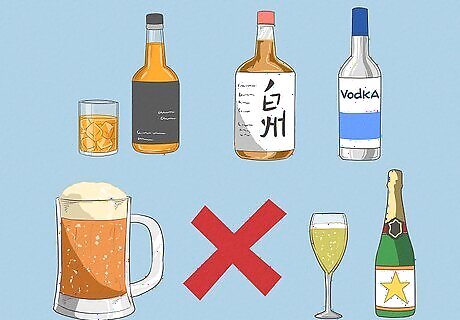
Reduce your alcohol intake. Try to reduce your alcohol intake, or cut it out completely, if possible. Alcohol increases the level of toxins in the body, which has a negative effect on the skin and contributes to aging and thinning.
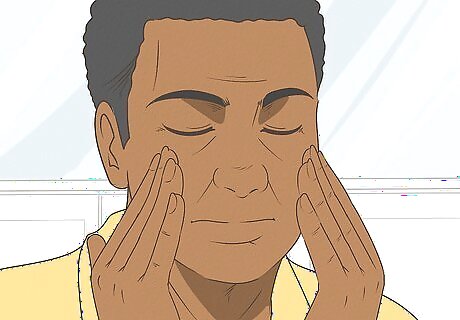
Massage the skin to improve circulation. Massage helps to improve the circulation of blood, allowing important nutrients to circulate throughout the body, nourishing and thickening the skin. Apply a massage oil to the skin and massage the area for at least 90 seconds. This should be done twice daily for best results.
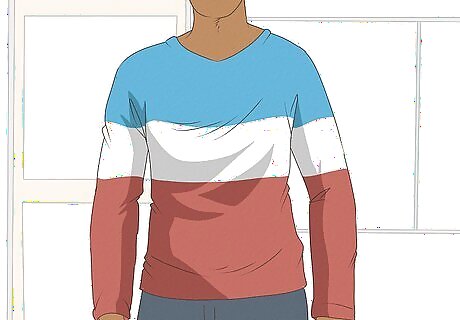
Wear long-sleeved clothes that protect your skin. Exposing your skin to sunlight can cause it to become thinner. Therefore you should wear long pants, long sleeved shirts and hats that have a broad rim in order to protect your skin from UV rays. The ultraviolet rays of the sun break the collagen in the skin, causing it to lose its elasticity. This makes the skin thinner and causes it to bruise more easily.




















Comments
0 comment